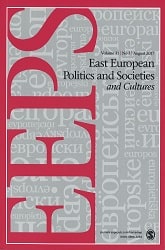The Politics of Dialects Among Serbs, Croats, and Muslims in the Former Yugoslavia
The Politics of Dialects Among Serbs, Croats, and Muslims in the Former Yugoslavia
Author(s): Robert D. GreenbergSubject(s): Political history, Sociolinguistics, South Slavic Languages, Government/Political systems, Politics and society, Social differentiation, Transformation Period (1990 - 2010), Inter-Ethnic Relations, Sociology of Politics, Identity of Collectives
Published by: SAGE Publications Ltd
Keywords: Politics of dialects; Serbs; Croats; Bosniaks; former Yugoslavia; official literary languages; Serbo-Croatian; nationalism; ethnicity;
Summary/Abstract: The disintegration of Yugoslavia in 1991 occasioned a new twist in the saga of the literary language(s) of Serbs, Croats, Muslims, and Montenegrins. In the summer of 1991 the Croatian and Serbian governments officially declared the end of "Serbo-Croatian," causing the unprecedented demise of an official literary language, which had enjoyed the status of the common language (lingua communis) for the former Yugoslavia. As linguistic realities do not come i nto being overnight, it is still unclear how many "Serbo-Croatian" successor languages will emerge and the extent of their differentiation. Therefore, this paper focuses on the period leading up to the Yugoslav and "Serbo-Croatian" break up, and in particular, on the controversies, both blatant and muted, surrounding the dialects in the Serbo-Croatian speech territory. The linguistic controversies clearly reflected the nationalist and ethnic tensions. Differences in dialects have been used to strengthen claims to specific regions, towns, and villages, culminating in demands of one side or another for new political boundaries among the Yugoslav successor states. [...]
Journal: East European Politics and Societies
- Issue Year: 10/1996
- Issue No: 03
- Page Range: 393-415
- Page Count: 23
- Language: English
- Content File-PDF

